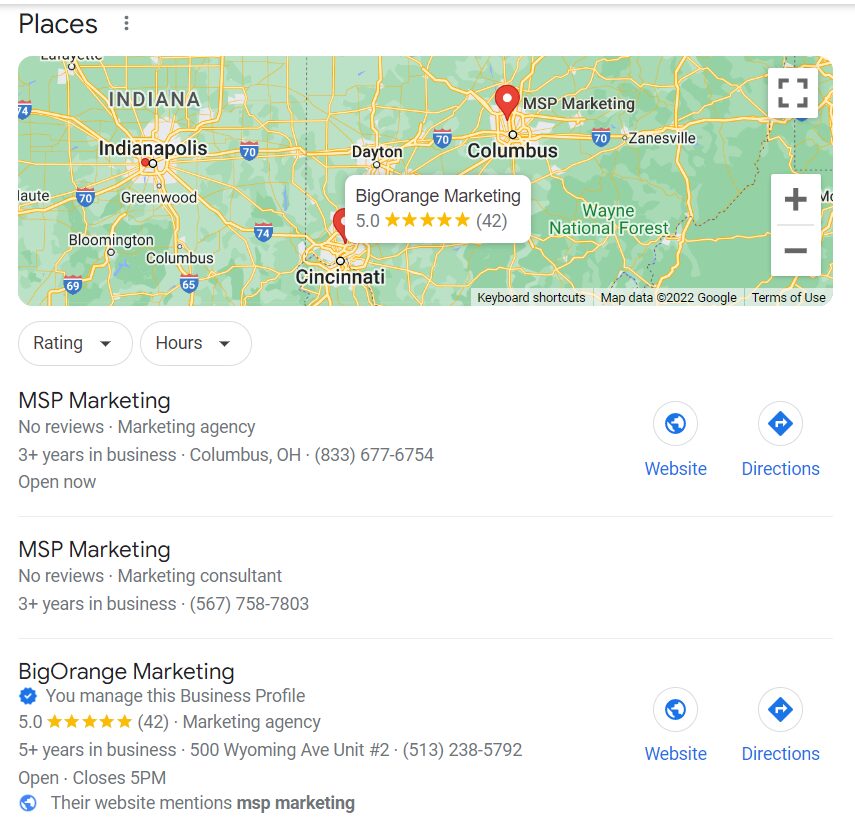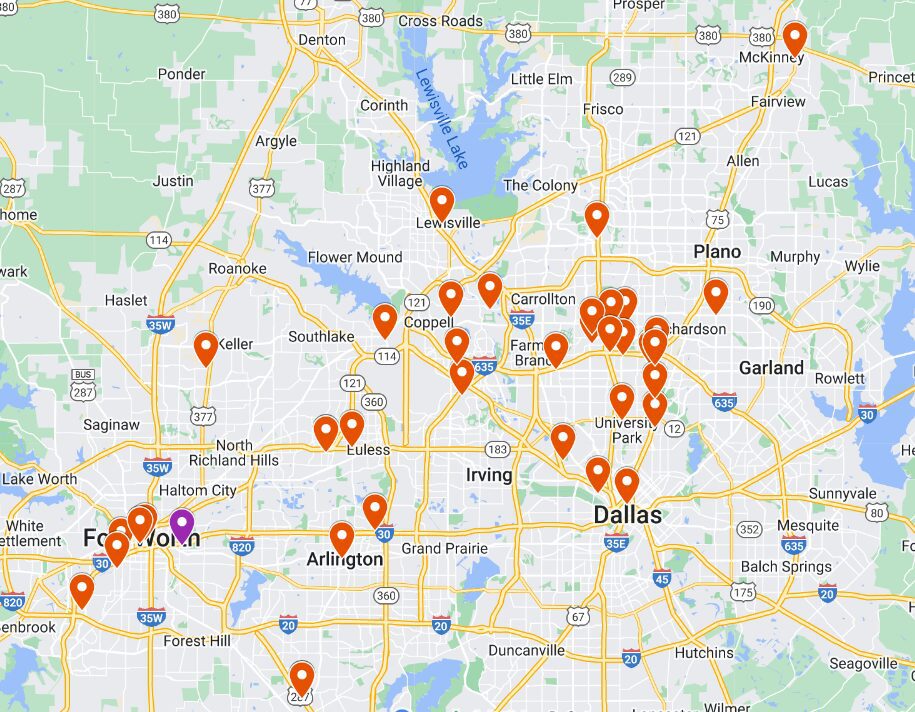Know Your Competitors: 4 Simple Steps for Understanding Your Competitive Landscape

Businesses focused on growth need to understand their competition. But too many times, leaders hone in on the companies they come up against in the bidding process, without understanding their competitive landscape as it appears in the customer’s journey. Here are four simple steps to better know your competitors without expensive tools or hours of research.
Step 1: Search for Your Services
Pick one or two of your business’s primary services and then run a Google search using an incognito tool like www.duckduckgo.com. If you don’t happen to be in the location of your service area, use Bright Local’s free local search tool to search from any location you choose.
Who is appearing on page one of the search engine results page (SERP)? Make sure you look not just in the listings, but in the ads and the “Local Pack” area as well (under the map).

These are your competitors — even if they don’t offer the same services, target different business sizes, are in a different city or you simply know them and don’t consider them a threat. Why? Because, when people search for your services, these are the businesses you will be seen next to.
As potential clients scan the SERP pages, they will be making conscious and unconscious decisions about each listing, whether it matches their search intent and whether they want to click and learn more. Having clear messaging that establishes your value and difference alongside these competitors needs to be an important part of your marketing strategy.
If your business is not page one in your local service area for your primary service offerings, you need to invest in SEO as part of your overall marketing strategy.
Then there is the situation where NONE of the SERP listings have anything to do with your business. Many times, terms in one industry can mean something completely different in another, or have an unrelated pop-culture meaning. If this is happening, you are probably focusing on the wrong keyword(s) for your business.
Step 2: Find Your Keyword Competitors
Searching your primary term or two will tell you about your most direct competitors or those who use the same terminology for their products or services as you do. But what about the outlier, the disruptors, bigger companies that offer your service set and more, smaller companies that provide a specialty niche service? Looking at a larger keyword list can help you identify these competitors. For this you will need a tool, but don’t worry, there are some good free ones to get you started.
The full versions of these tools can be costly, but each has free offerings to compare domains, find keyword gaps and more. The free versions show you a fraction of the total data available and have a limited number of reports per day. But even with those limitations, the results can be helpful.
You could also find a marketing partner to help with the analysis. At BigOrange Marketing, we use a variety of these and other paid tools to help clients understand their competitive landscape.
Step 3: Map It Out
Similar to step 1, now you are going to search in Google Maps. We like to create a map of our own, using My Maps. Add your business and all your competitors from any source. If you have multiple service areas, you can even create layers to easily toggle these to show or hide. Create a separate layer for your locations. You can color code competitors as well if desired. Here’s a simple one we did for a Dallas Fort Worth area business.

Maps can be an effective tool to guide your messaging. For instance, say you have a business with a physical store or on-premises service location, a map can help you visualize the competitors your customers literally need to drive past to come to you. What value do you provide that would make that worth their time? How do you communicate that value?
If your company doesn’t have a physical location customers might visit, the map can still be a helpful tool. It tells a compelling visual story for your internal team on the number of choices your clients have and the need to continually build and improve your customer relationships to get or stay ahead of the competition.
Step 4: Make a Plan
All the information in the world won’t help your business if you don’t use it. Make a plan to address what you learned from your competitive analysis. Common tactics that might be a part of such a plan include:
- Add differentiator messaging to your site and other marketing channels. You don’t have to name names, but highlight why customers should choose your services, products or company in a way that will set you apart from others in your landscape. The StoryBrand framework is an excellent tool to get you there.
- Improve your SERP placement. If you are not appearing where you need to be, make a plan to get there. Plan long-term, sustainable SEO practices alongside quick-fix actions like social media and paid ad campaigns.
- Boost local search/maps appearance. If you don’t have a local search strategy in place, get one. Start with citation building and brand alignment across all channels.
- Leverage marketing automation to reinforce your messaging over time and stay in contact with current and potential customers.
You don’t have to go it alone. The right partner can make your marketing journey easy, cost effective and fun. Book a meeting with a BigOrange Marketing consultant and let us help you get leads and grow.
Share the knowledge
Is StoryBrand Free?
On its website, StoryBrand offers various resources, some of which are free, such as the StoryBrand podcast and blog. However, more comprehensive resources, like the…
Explore this TopicIs It Worth It to Become a StoryBrand Guide?
Becoming a StoryBrand Guide can be worth it for those looking to enhance their marketing expertise and help businesses communicate more personally with their audiences.…
Explore this TopicWhat Are Examples of a StoryBrand Website?
An example of a StoryBrand website includes Internos Group’s website, which explains the company’s Miami IT services. The site clearly appeals to the customer’s goals,…
Explore this TopicWhat Is the Process Plan of StoryBrand?
The StoryBrand process and its plan are based on a framework designed by Donald Miller to help businesses more effectively communicate their core messages to…
Explore this TopicLearn How to Create an MSP Marketing Plan with BigOrange at ChannelPro Live
ChannelPro Live is the must-be-at event for IT companies to learn and network with their peers and vendors. At the show, BigOrange Marketing CEO Margee…
Explore this TopicUnlocking the Potential of Video Marketing: 5 Proven Tactics
In the digital age, where attention spans are fleeting and competition is fierce, businesses are constantly seeking innovative ways to reach audiences and drive engagement.…
Explore this TopicBack to the Future of Marketing: The Do’s and Don’ts of AI-Powered Marketing Inspired by ‘80s Blockbusters Webinar
Ready to set your brand up for success? By now, it’s widely known that artificial intelligence (AI) can help businesses improve their sales and marketing…
Explore this Topic









